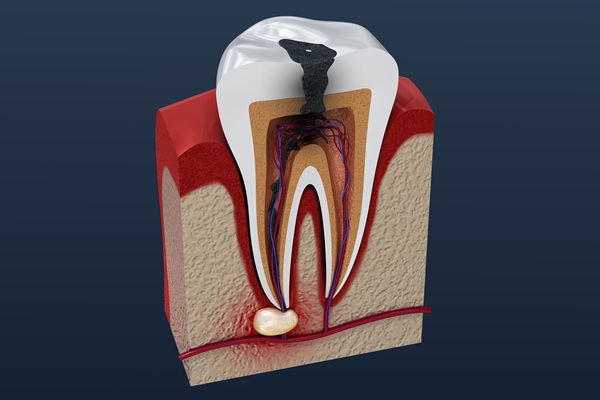What is Root Canal Therapy?

Your dentist may recommend root canal therapy if you have severe tooth damage or deep dental decay. When performed, it is often a necessary step to save the tooth from falling out or to prevent the infection from spreading. There are certain symptoms that may suggest root canal therapy is necessary, and it is helpful to become more familiar with them. When root canal therapy is needed, it also helpful to understand what the treatment is exactly.
A review of root canal therapy
Root canal therapy is a common dental procedure that most dentists offer. It is safe and effective, but more invasive than dental fillings and various other similar procedures. The following is an overview of what root canal therapy is, when it might be necessary and what you can expect throughout the treatment and aftercare.
Root canal therapy defined
Root canal therapy is a dental procedure that removes and replaces infected and damaged dental pulp in the root of a tooth. Root canal therapy is needed if a tooth infection develops and cannot be treated through less invasive methods, such as antibiotics or draining the dental abscess. Root canal therapy can also address severe tooth decay that cannot be treated with a dental filling. The primary purpose of root canal therapy is to address the underlying symptoms and prevent the tooth from becoming lost.
Symptoms of a root canal infection
The symptoms may vary for each patient, but there are certain symptoms that are more common among those who need a root canal procedure. The most common symptoms include:
- Deep tooth decay
- Tooth pain and sensitivity
- Swollen and sore gums
- Fever and swollen lymph nodes
If there are any oral health symptoms that become intolerable or exist for an extended period of time, then it is important to visit the dentist for a visit to see what the best course of treatment is.
How root canal therapy is performed
The typical procedure for root canal therapy includes accessing the dental pulp inside of the tooth root, removing the infected tooth pulp, sealing the tooth with a filling material and attaching a dental crown. The procedure does not take more than a couple of hours, and the procedure itself is not painful for the patient.
Tips for root canal aftercare
Although the root canal procedure itself may not be painful, there will be some discomfort during the recovery process. The best way to minimize discomfort during recovery is by keeping the mouth clean through good oral hygiene practices, avoiding hard foods or foods high in sugar and drinking water throughout the day to wash away bacteria and food particles. You can also ice the affected area and take pain relief medication as directed by the dentist.
Contact our dental team for more information
Our dentistry offers root canal therapy, and we help our patients through each step of the process. Reach out to us today to learn more about root canal therapy and to arrange a time to visit with our friendly dental team.
Request an appointment here: https://www.playavistadentalcare.com or call Playa Vista Dental Care at (310) 589-3146 for an appointment in our Playa Vista office.
Check out what others are saying about our dental services on Google: Root Canal in Playa Vista, CA.
Recent Posts
Patients often search for root canal treatment when a tooth aches from deep decay, a crack, or inflamed pulp tissue. This therapy removes irritated nerve tissue, disinfects the canal space, and seals the tooth to prevent reinfection. By preserving the natural root, the procedure maintains bite balance and chewing strength. With careful planning, a restored…
Root canal therapy is a commonly performed dental treatment that is used to treat infection or swelling of the pulp tissues inside a tooth. A tooth’s pulp is the blood vessels and nerves in its innermost layer called the pulp chamber. It is sealed off from the rest of a tooth to protect its sensitive…
A root canal is a treatment that can keep your tooth intact. The dentist will assess your tooth and ask you about your symptoms. But knowing if you need this treatment can tell you if you need to see your dentist for this procedure soon. Here are the common signs you need a root canal…
The term root canal treatment refers to the inner chamber between the tooth roots and the pulp, and also to the dental treatment for removing infected pulp material. Tooth infections can cause severe tooth pain and often necessitate tooth extraction. With root canal treatment, a dentist may be able to save the tooth and alleviate…


